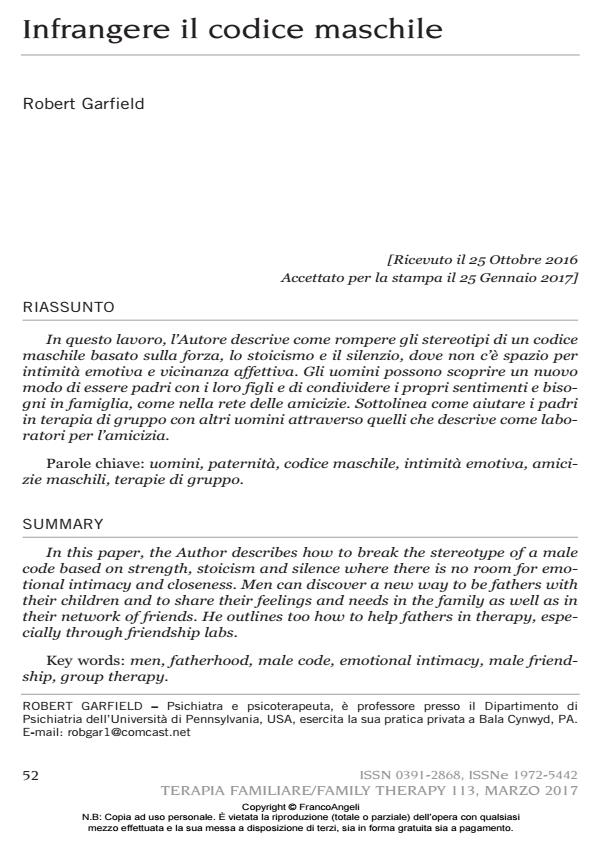Infrangere il codice maschile
Journal title TERAPIA FAMILIARE. Rivista interdisciplinare di ricerca ed intervento relazionale
Author/s Robert Garfield
Publishing Year 2017 Issue 2017/113
Language Italian Pages 14 P. 52-65 File size 102 KB
DOI 10.3280/TF2017-113004
DOI is like a bar code for intellectual property: to have more infomation
click here
Below, you can see the article first page
If you want to buy this article in PDF format, you can do it, following the instructions to buy download credits

FrancoAngeli is member of Publishers International Linking Association, Inc (PILA), a not-for-profit association which run the CrossRef service enabling links to and from online scholarly content.
In this paper, the Author describes how to break the stereotype of a male code based on strength, stoicism and silence where there is no room for emotional intimacy and closeness. Men can discover a new way to be fathers with their children and to share their feelings and needs in the family as well as in their network of friends. He outlines too how to help fathers in therapy, especially through friendship labs.
Keywords: Men, fatherhood, male code, emotional intimacy, male friendship, group therapy.
- Ascher M. (2015). Failure to Launch Syndrome: What You Need to Know to Help Your Dependent Adult Child. The Huffington Post, 2.
- Conroy P. (1976). The Great Santini. New York: Random House.
- deMause L. (2010). Why Men are More Violent. Journal of Psychohistory, 34, 4: 2-15.
- Farr R.H., Patterson C.J. (2013). Co-parenting among Lesbian, Gay, and Heterosexual Couples: Associations with Adopted Children’s Outcomes. Child Development, 84, 4: 1226-40.
- Fehr B. (1996). Friendship Processes. Thousand Oaks, CA: Sage.
- Garfield R. (2015). Breaking the Male Code: Unlocking the Power of Friendship. New York: Penguin/Random House.
- Heasley R., Garfield R., Anderson J. (2015). The Male Friendship and Emotional Intimacy (MFEI) Survey: An Initial Report. In: Garfield R., Breaking the Male Code: Unlocking the Power of Friendship. New York: Penguin.
- Miller A. (1949). Death of a Salesman (trad. it.: Morte di un commesso viaggiatore. Milano: Garzanti, 1952).
- Osherson S. (1991). Finding our fathers. New York: McGraw Hill.
- Papernow P. (2013). Surviving and thriving in stepfamily relationships: what works and what does not. New York: Routledge.
- Parker K., Wang W. (2013). Modern parenthood: roles of moms and dads converge as they balance work and family. Pew Research Social & Demographic Trends, March 14.
- Pleck J. (1995). The gender role strain paradigm. In: Levant R.F., Pollack W.S. (eds.), A new psychology of men. New York: Basic Books.
- Silverstein O. (1995). The Courage to Raise Good Men. New York: Penguin.
- Taylor S.E., Klein L., Lewis B.P., Gruenewald T.L., Gurung R.A., Updegraff J.A. (2000). Bio behavioral responses to stress in females: Tend-and-befriend, not fight-or-flight. Psychological Review, 107 (3): 411-29. DOI: 10.1037/0033-295X.107.3.41
- Pezzi di padri. Ricomporre ruoli e funzioni dopo la ferita del divorzio Dorothy Sommella, Juliana Seger Sanvicente, Vito Sugamele, Francesca Treccani, Antonello D’Elia, in TERAPIA FAMILIARE 124/2021 pp.99
DOI: 10.3280/TF2020-124006
Robert Garfield, Infrangere il codice maschile in "TERAPIA FAMILIARE. Rivista interdisciplinare di ricerca ed intervento relazionale" 113/2017, pp 52-65, DOI: 10.3280/TF2017-113004